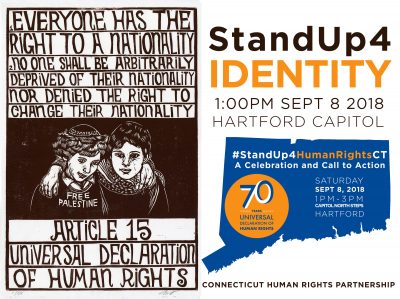
Welcome to Day 27 of our countdown to the #StandUp4HumanRightsCT rally on September 8th!
Today’s post is dedicated to Article 15 of the UDHR, which states: (1) Everyone has the right to a nationality. (2) No one shall be arbitrarily deprived of his/her nationality nor denied the right to change his/her nationality.
Stateless human beings are one of the most vulnerable populations to human rights violations. In fact, the right to a nationality is often described as the “right to have rights,” as it implies both legal protection from the state as well as the ability to exercise one’s own rights and hold others accountable for any transgressions. Other notable international documents also express the importance of the right to a nationality, such as
Article 5 of the International Convention on the Elimination of All Forms of Racial Discrimination (https://www.ohchr.org/EN/ProfessionalInterest/Pages/CERD.aspx)
and
Article 7 of the Convention on the Rights of the Child (https://www.ohchr.org/EN/ProfessionalInterest/Pages/CRC.aspx), exemplifying how the right to a nationality encompasses other human rights.
Many of you may understand the extremely challenging process of obtaining citizenship in the United States (though some other countries have more stringent immigration laws). First off, fees relating to applications, immigration lawyers, and the like can quickly end up in the thousands, making it virtually impossible for one to even begin the citizenship process. However, the true cost may not necessarily be quantifiable. Numerous procedural delays can have applicants waiting in a hopeless limbo for years. Additionally, many who speak limited English may have a difficult time understanding the questions when it comes time to the test. The entire process, instead of representing acceptance and opportunity, actually appears to have the objective of deterring immigrants from becoming U.S. citizens.
One can celebrate their heritage while being a citizen of a country. Numerous Americans have been ostracized and punished for celebrating their cultural identities, and racial discrimination and xenophobia have nearly become staples in American culture. We should know that appearance does not imply nationality and that a certain nationality does not lend itself to a specific appearance.
What does being a citizen mean to you? Write your answers in the comments!
—–
Be sure to spread the word about the celebration event on September 8th!
Follow the event countdown on Facebook and Instagram, and be sure to repost with #StandUp4HumanRightsCT
This will be a great venue for you to hear from local activists, network with others, and find out what you can do in your own community to create change!